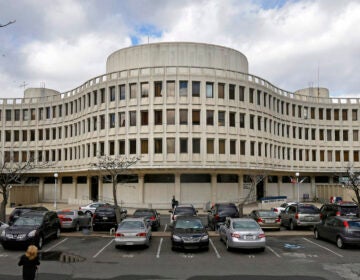Specter archive collection to be shared by Pitt and Phila U.
The “bulk” of U.S. Sen. Arlen Specter’s archives will soon reside at the University of Pittsburgh.
On Monday, Philadelphia University in East Falls announced a partnership that will send hundreds of documents and other materials tied to the late lawmaker’s 50 years of public life to Pitt’s Archives Service Center.
Specter, who died of cancer last October at the age of 82, donated his extensive archive to Philadelphia University in December 2010 as part of the private institution’s Arlen Specter Center for Public Policy.
The Arlen Specter Collection, however, is so vast that it requires an off-campus storage site.
Under the agreement, Pitt’s University Library System will organize and manage the archive for the next four years and store it for 30 years. That effort will also involve digitizing some materials.
Philadelphia University will maintain ownership of the collection, but materials will be available to students, researchers, and the general public. The two universities will also collaborate on educational programming.
Role of the Roxboro House
Thanks to a mix of public and private dollars, Philadelphia University is in the process of renovating an historic home in East Falls that will, among other things, host exhibitions tied to the collection.
Construction at the Roxboro House, located across the street from the university’s main campus, is expected to be completed in February 2014, according to a university spokesperson.
“It’s nice to have the east and west coming together for this,” said Karen Albert, director of the Paul G. Gutman Library at Philadelphia University and coordinator of the Arlen Specter Center for Public Policy.
More than 2,700 boxes comprise the collection.
An extensive collection
The archives include materials from Specter’s work on the Warren Commission’s investigation of President John F. Kennedy’s assassination and his decision to cross party lines to vote against the nomination of Judge Robert H. Bork to the U.S. Supreme Court in 1987.
Until 2009, Specter was a longtime Republican.
Wary of his chances of beating Republican candidate Pat Toomey, Specter became a Democrat that year to take on U.S. Rep. Joe Sestak in the Democratic Primary.
Specter lost his bid for a sixth term. Toomey earned the seat.
As a staffer with the Warren Commission in the 1960s, Specter helped develop the “single-bullet theory,” which posited that President Kennedy and Texas Governor John Connally were struck by the same piece of ammo.
The first exhibition of the Arlen Specter Center for Public Policy will feature items from that investigation. The exhibit, which will run from Oct. 14, 2013 to April 15, 2014, will coincide with the 50th anniversary of Kennedy’s assassination.
The collection also notably includes documents from Specter’s memorable interrogation of Anita Hill during the confirmation hearings for Supreme Court nominee Clarence Thomas. Hill, a law professor, alleged that Thomas had sexually harassed her.
“Broadly speaking, if one thinks about the span of time that Specter was in public life…that’s a fairly broad swath of history,” said Michael J. Dabrishus, assistant university librarian at the University of Pittsburgh.
WHYY is your source for fact-based, in-depth journalism and information. As a nonprofit organization, we rely on financial support from readers like you. Please give today.




